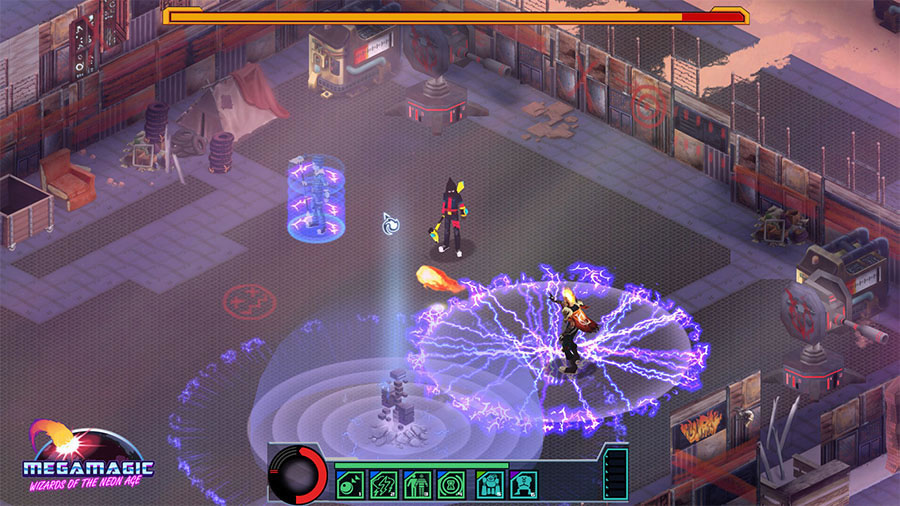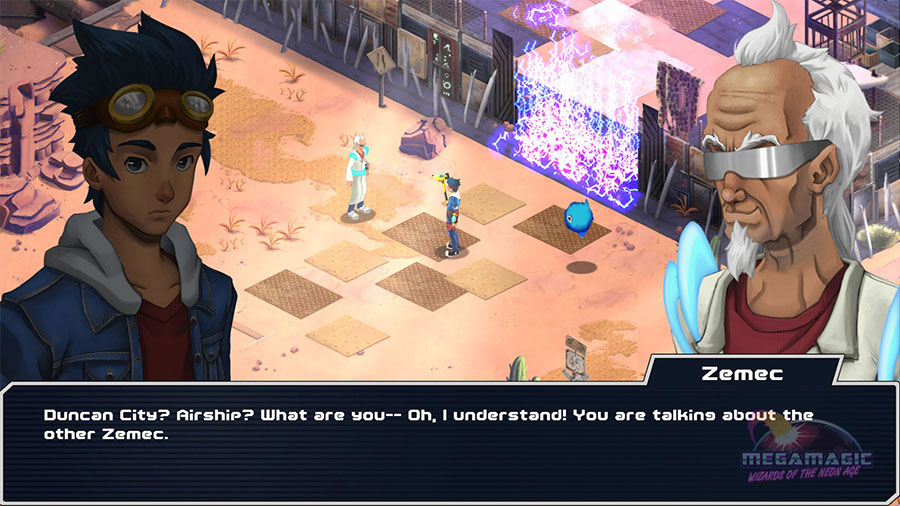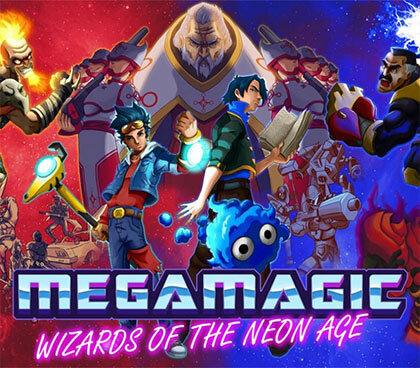- CLASSIC MAGAZINES
- REVIEW CREW
A show recapping what critics thought back
when classic games first came out! - NEXT GENERATION'S BEST & WORST
From the worst 1-star reviews to the best
5-stars can offer, this is Next Generation! - NINTENDO POWER (ARCHIVE)
Experience a variety of shows looking at the
often baffling history of Nintendo Power! - MAGAZINE RETROSPECTIVE
We're looking at the absolutely true history of
some of the most iconic game magazines ever! - SUPER PLAY'S TOP 600
The longest and most ambitious Super NES
countdown on the internet! - THEY SAID WHAT?
Debunking predictions and gossip found
in classic video game magazines! - NEXT GENERATION UNCOVERED
Cyril is back in this spin-off series, featuring the
cover critic review the art of Next Generation! - HARDCORE GAMER MAGAZING (PDF ISSUES)
Download all 36 issues of Hardcore Gamer
Magazine and relive the fun in PDF form!
- REVIEW CREW
- ELECTRONIC GAMING MONTHLY
- ELECTRONIC GAMING MONTHLY RANKS
From Mario to Sonic to Street Fighter, EGM
ranks classic game franchises and consoles! - ELECTRONIC GAMING MONTHLY BEST & WORST
Counting down EGM’s best and worst reviews
going year by year, from 1989 – 2009! - ELECTRONIC GAMING BEST & WORST AWARDS
11-part video series chronicling the ups and
downs of EGM’s Best & Worst Awards!
- ELECTRONIC GAMING MONTHLY RANKS
- GAME HISTORY
- GAME OVER: STORY BREAKDOWNS
Long-running series breaking down game
stories and analyzing their endings! - A BRIEF HISTORY OF GAMING w/ [NAME HERE]
Real history presented in a fun and pithy
format from a variety of game historians! - THE BLACK SHEEP
A series looking back at the black sheep
entries in popular game franchises! - INSTANT EXPERT
Everything you could possibly want to know
about a wide variety of gaming topics! - FREEZE FRAME
When something familiar happens in the games
industry, we're there to take a picture! - I'VE GOT YOUR NUMBER
Learn real video game history through a series
of number-themed episodes, starting at zero! - GREAT MOMENTS IN BAD ACTING
A joyous celebration of some of gaming's
absolute worst voice acting!
- GAME OVER: STORY BREAKDOWNS
- POPULAR SHOWS
- DG NEWS w/ LORNE RISELEY
Newsman Lorne Riseley hosts a regular
series looking at the hottest gaming news! - REVIEW REWIND
Cyril replays a game he reviewed 10+ years
ago to see if he got it right or wrong! - ON-RUNNING FEUDS
Defunct Games' longest-running show, with
editorials, observations and other fun oddities! - DEFUNCT GAMES QUIZ (ARCHIVE)
From online quizzes to game shows, we're
putting your video game knowledge to the test!- QUIZ: ONLINE PASS
Take a weekly quiz to see how well you know
the news and current gaming events! - QUIZ: KNOW THE GAME
One-on-one quiz show where contestants
find out if they actually know classic games! - QUIZ: THE LEADERBOARD
Can you guess the game based on the classic
review? Find out with The Leaderboard!
- QUIZ: ONLINE PASS
- DEFUNCT GAMES VS.
Cyril and the Defunct Games staff isn't afraid
to choose their favorite games and more! - CYRIL READS WORLDS OF POWER
Defunct Games recreates classic game
novelizations through the audio book format!
- DG NEWS w/ LORNE RISELEY
- COMEDY
- GAME EXPECTANCY
How long will your favorite hero live? We crunch
the numbers in this series about dying! - VIDEO GAME ADVICE
Famous game characters answer real personal
advice questions with a humorous slant! - FAKE GAMES: GUERILLA SCRAPBOOK
A long-running series about fake games and
the people who love them (covers included)! - WORST GAME EVER
A contest that attempts to create the worst
video game ever made, complete with covers! - LEVEL 1 STORIES
Literature based on the first stages of some
of your favorite classic video games! - THE COVER CRITIC
One of Defunct Games' earliest shows, Cover
Critic digs up some of the worst box art ever! - COMMERCIAL BREAK
Take a trip through some of the best and
worst video game advertisements of all time! - COMIC BOOK MODS
You've never seen comics like this before.
A curious mix of rewritten video game comics!
- GAME EXPECTANCY
- SERIES ARCHIVE
- NINTENDO SWITCH ONLINE ARCHIVE
A regularly-updated list of every Nintendo
Switch Online release, plus links to review! - PLAYSTATION PLUS CLASSIC ARCHIVE
A comprehensive list of every PlayStation
Plus classic release, including links! - RETRO-BIT PUBLISHING ARCHIVE
A regularly-updated list of every Retro-Bit
game released! - REVIEW MARATHONS w/ ADAM WALLACE
Join critic Adam Wallace as he takes us on a
classic review marathon with different themes!- DEFUNCT GAMES GOLF CLUB
Adam Wallace takes to the links to slice his way
through 72 classic golf game reviews! - 007 IN PIXELS
Adam Wallace takes on the world's greatest spy
as he reviews 15 weeks of James Bond games! - A SALUTE TO VAMPIRES
Adam Wallace is sinking his teeth into a series
covering Castlevania, BloodRayne and more! - CAPCOM'S CURSE
Adam Wallace is celebrating 13 days of Halloween
with a line-up of Capcom's scariest games! - THE FALL OF SUPERMAN
Adam Wallace is a man of steel for playing
some of the absolute worst Superman games! - THE 31 GAMES OF HALLOWEEN
Adam Wallace spends every day of October afraid
as he reviews some of the scariest games ever! - 12 WEEKS OF STAR TREK
Adam Wallace boldly goes where no critic has
gone before in this Star Trek marathon!
- DEFUNCT GAMES GOLF CLUB
- DAYS OF CHRISTMAS (ARCHIVE)
Annual holiday series with themed-episodes
that date all the way back to 2001!- 2015: 30 Ridiculous Retro Rumors
- 2014: 29 Magazines of Christmas
- 2013: 29 Questionable Power-Ups of Christmas
- 2012: 34 Theme Songs of Christmas
- 2011: 32 Game Endings of Christmas
- 2010: 31 Bonus Levels of Christmas
- 2009: 30 Genres of Christmas
- 2008: 29 Controls of Christmas
- 2007: 34 Cliches of Christmas
- 2006: 33 Consoles of Christmas
- 2005: 32 Articles of Christmas
- 2004: 31 Websites of Christmas
- 2003: 29 Issues of Christmas
- 2002: 28 Years of Christmas
- 2001: 33 Days of Christmas
- NINTENDO SWITCH ONLINE ARCHIVE
- REVIEW ARCHIVE
- FULL ARCHIVE
Megamagic: Wizards of the Neon Age
It's rare to be able to pinpoint the exact moment you lost interest in a game. Normally, it's a few small issues that start to add up and take their toll, but that's not the case with Megamagic: Wizards of the Neon Age. With a compelling story and great sense of humor, I spent most of the time really impressed with Beautifun Games' newest release. But halfway through this epic adventure, there is a moment so egregiously broken that it colored my opinion of the rest of the game. It was at that moment Megamagic completely lost me.
But there's no time to get into that yet, because there's a lot to dig up in the Neon Age wasteland. Set in a retro-future world inspired by 1980s nostalgia, Megamagic tells the story of two brothers -- Phoban and Deimon. Years ago, on a particularly stormy night, their father snuck them into Grove Valley to live with their uncle. He knew this would be a safe place to keep his boys away from the horrors of the world, as well as to hide a magical staff and book from the evil forces after him.
As it turns out, there's a lot more to those mysterious treasures than anybody expected. Phoban is blown away when he is able to summon Fum, a little smoky creature that allows the teenager to pull off magical spells. The two become best friends, working day and night to hone their skills in hopes of going to the nearby temple and becoming a wizard. But when a monk named Merklyn gets a look at Fum, suddenly everything changes. When Phoban won't hand his smoky friend over to the religious order, this sends the duo fleeing for their lives. And if being on the lam wasn't bad enough, the once-peaceful Grove Valley has been turned upside down by a zombie attack.
This sets up what turns out to be a convoluted action/adventure game full of twists and surprises. Phoban's journey will take him into a Mad Max-style post-apocalyptic wasteland, where he'll get mixed up with a bunch of punks. He'll fight through the nearby temple to learn more about a demonic force known as Erasers. He'll explore the countryside in hopes of finding new skills and summons. And, if he's lucky, Phoban will figure out once and for all why his father would risk his life to possess this magical staff.
Speaking of which, Phoban's powers extend far beyond shooting tiny energy balls. The teenager is capable of summoning helper characters, such as robots, zombies and mechanical dogs. We're able to order them around the screen, not unlike a very simple real-time strategy game. This gives the enemies something else to attack and allows our hero to regain an upper hand on the chaotic action.
 Click For the Full Picture Archive
Click For the Full Picture ArchivePhoban doesn't have any punches or kicks; he fights with his magical staff. Although it starts with only a couple of attacks, he'll quickly find and unlock new spells to use against the hordes of undead creatures. There are sixteen spells in all, ranging from a ball that ping-pongs between enemies, a gust of wind that pushes enemies away, a black hole that sucks everything to one location and, my favorite, the Mega Ball, which reminds me of Smash TV's grenade lobber. Players can switch between up to eight attacks and summons at any given time.
This is both the best and worst part of Megamagic. Right off the bat, the action is fast and exciting. In theory, Phoban can cycle through his attacks to create powerful combos. These firefights are exciting at first, but quickly become overwhelming to the point of frustration. The problem is that you can't stop time to catch your breath and switch between spells. You have to cycle through attacks, manage your summons and dodge enemy shots all in real-time, which can be a bit much at times. I'm glad the developers didn't opt for the turn-based approach, but this game is in serious need of a Fallout-style pause in the action.
It certainly doesn't help that the roaming bad guys are needlessly aggressive. As soon as an enemy sees you, they'll begin their chase, usually with many more joining in on the hunt. With the action moving so quickly, it's nearly impossible to keep track of everything. And the moment Phoban finds himself outnumbered; he'll die a horrible death and lose a bunch of progress. Too many battles devolved in little more than me running in circles trying to take an enemy out one at a time.
 Click For the Full Picture Archive
Click For the Full Picture ArchiveNormally the levels are large enough to allow our teenage hero to stay a certain distance from the bad guys, but this is not always the case. There are times when the game will inexplicably lock the camera, forcing us to fight in cramped areas filled with overpowered enemies. There's one 10 minute stretch in particular that I spent three straight hours trying to beat, only to keep failing due to cheap and unavoidable deaths. There were way too many enemies to contend with in such a tiny space, something that frustratingly highlighted all of the problems with Megamagic's combat. It was at that moment this game completely lost me.
Even after I finally managed to get through the section by the skin of my teeth, it was clear that the momentum had shifted. You can't unring a bell, and I had a hard time looking at the game the same way after seeing the combat mechanics break down so spectacularly. Even as the big twists and turns washed over my eyes, I found myself weirdly apathetic. All of the pieces were still there, but it just wasn't the same.
This is a crushing disappointment, as I like nearly everything else about Megamagic's design. I'm a big fan of the cheeky story and how it pulls from 1980s nostalgia without being too referential. I like the simple, yet colorful art style and the unique enemy designs. It's nice that this is an action/adventure game not stuck in a strictly fantasy setting; the retro-future design allows it to stand out. Unfortunately, all of the game's best attributes are overshadowed by the unbalanced gameplay.
With a few tweaks to the combat and the elimination of one especially egregious mission, Megamagic: Wizards of the Neon Age would be an incredibly easy game to recommend. As it is, I can't help but yearn for what could have been.
HOME |
CONTACT |
NOW HIRING |
WHAT IS DEFUNCT GAMES? |
NINTENDO SWITCH ONLINE |
RETRO-BIT PUBLISHING
Retro-Bit |
Switch Planet |
The Halcyon Show |
Same Name, Different Game |
Dragnix |
Press the Buttons
Game Zone Online | Hardcore Gamer | The Dreamcast Junkyard | Video Game Blogger
Dr Strife | Games For Lunch | Mondo Cool Cast | Boxed Pixels | Sega CD Universe | Gaming Trend
Game Zone Online | Hardcore Gamer | The Dreamcast Junkyard | Video Game Blogger
Dr Strife | Games For Lunch | Mondo Cool Cast | Boxed Pixels | Sega CD Universe | Gaming Trend
Copyright © 2001-2025 Defunct Games
All rights reserved. All trademarks are properties of their respective owners.
All rights reserved. All trademarks are properties of their respective owners.





























